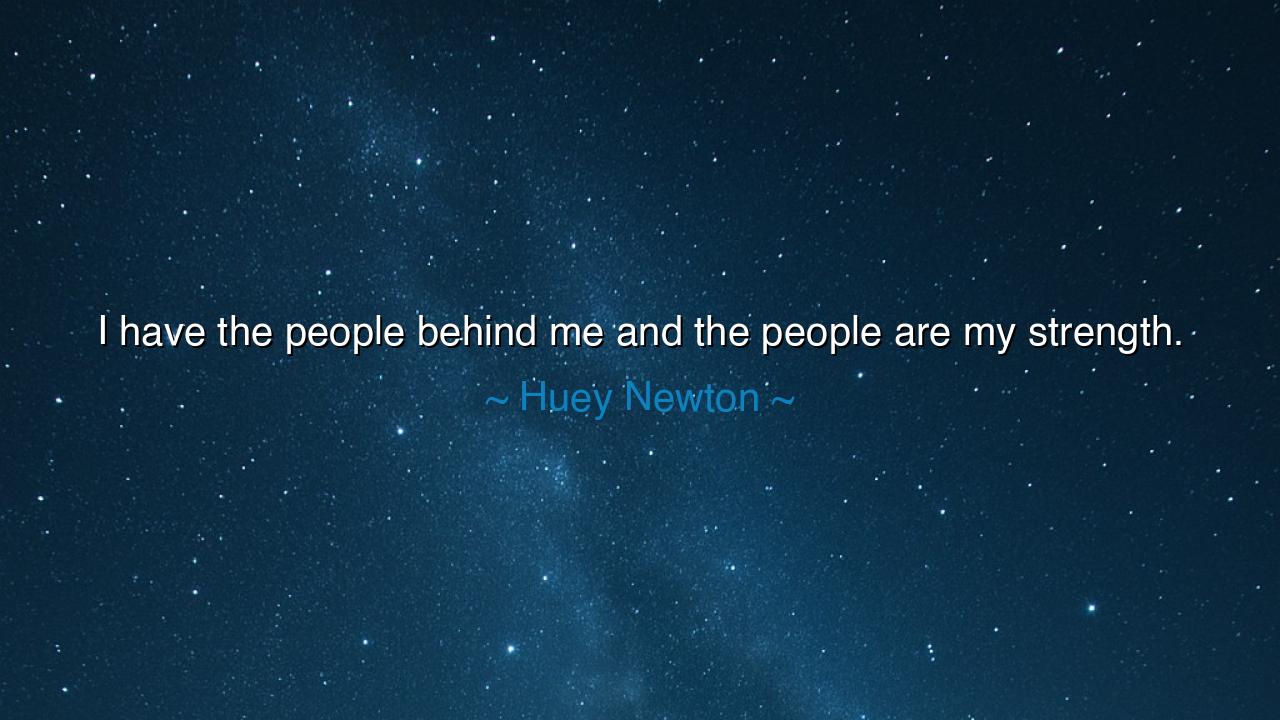
I have the people behind me and the people are my strength.






The words of Huey Newton, co-founder of the Black Panther Party, still thunder across the corridors of history: “I have the people behind me and the people are my strength.” These are not idle words, nor are they the boast of a solitary man. They are the declaration of one who understood that true power does not rest in crowns, armies, or treasuries, but in the hearts and will of the people. His voice was not his own alone; it was the voice of a multitude rising through him, a living testament that the mightiest fortress is not built of stone, but of human unity.
To say, “I have the people behind me,” is to affirm that one’s cause has transcended selfish ambition. It is to become the vessel of a shared yearning, a chosen instrument of the collective spirit. A leader without the people is but a shadow, destined to fade. But a leader with the people behind him becomes unbreakable, for his strength is not confined to flesh or bone — it is multiplied by every hand, every heart, every voice that walks beside him. This is the strength Newton spoke of, the strength born not from domination, but from solidarity.
We have seen this truth carved again and again upon the pages of time. Recall the story of Mahatma Gandhi, who faced down the empire of Britain not with weapons, but with the strength of the people. Alone, Gandhi was a frail figure, easily crushed by the machinery of colonial power. But behind him marched millions, bound not by chains but by shared conviction. Together, they shook the world until the mighty empire bent. Thus it is revealed: the strength of one man becomes the strength of many, and the strength of many becomes the strength of destiny itself.
Newton, too, drew from this ancient truth. In the 1960s, when oppression weighed heavily upon Black communities in America, when injustice poisoned the streets and silenced voices, Newton proclaimed that the people were his source of power. With the Panthers, he sought not to be exalted as an untouchable leader, but to empower his community — to feed the hungry, to defend the vulnerable, to teach the unlearned. His strength was not his own, but the reflection of the people’s cry for dignity and freedom.
But let us not be deceived: to hold the people behind you is not an easy burden. For the love of the people can lift a leader, but their betrayal or disappointment can crush him. The bond must be forged with truth, justice, and service, for only then will the multitude remain steadfast. History remembers those who ruled with tyranny and sought to bend the people to their own will. Their power crumbled, for it was not born of the people, but stolen from them. Newton’s words remind us that real strength cannot be taken; it must be given freely, through trust and shared struggle.
The lesson, then, is this: seek not to be mighty in isolation, but to be strong in communion. If you would rise, do not climb upon the backs of others — instead, lift them, and in their rising you too will rise. If you would endure, do not hoard power for yourself — instead, give it to the people, and they will make you unshakable. The throne of unity is higher than the throne of conquest, for it cannot be toppled by a single blow.
In your own life, remember these teachings. Stand with your community, your neighbors, your kin. Offer your voice to the voiceless and your hand to the weary. Know that your strength increases when it is shared, and that your victories grow eternal when they are carried by many. Do not ask, “What can I gain for myself?” Ask instead, “What can I give that will strengthen us all?” For when the people are with you, you will never walk alone.
Thus, let Huey Newton’s words be etched upon your heart: “I have the people behind me and the people are my strength.” For it is only in the strength of the people that true leaders are born, and only in their unity that justice, freedom, and hope can endure across the ages.






AAdministratorAdministrator
Welcome, honored guests. Please leave a comment, we will respond soon